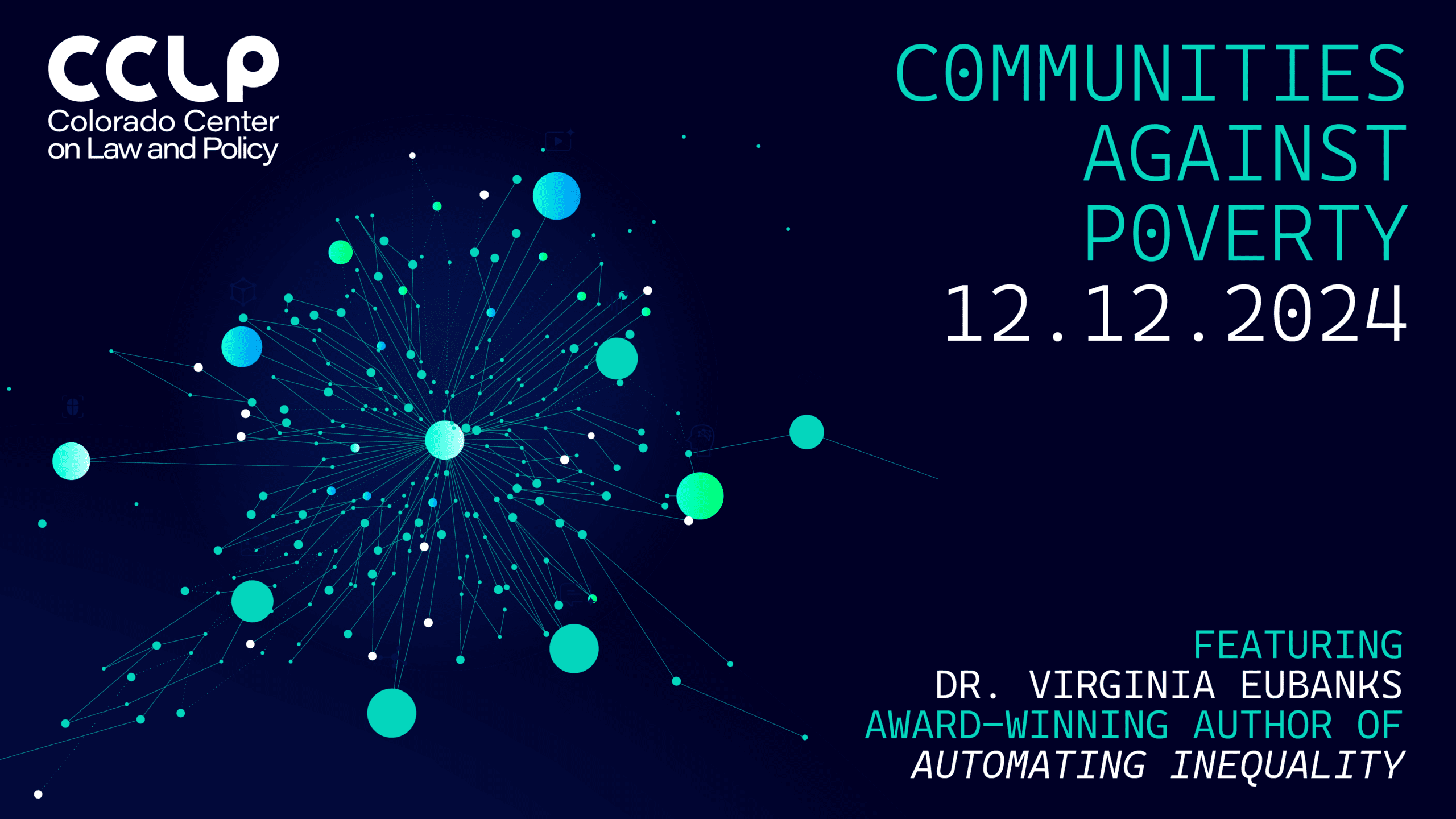Join us for our annual Communities Against Poverty event on Thursday, December 12th from 11am to 1pm at History Colorado Center! You will hear from our keynote speaker Dr. Virginia Eubanks, award-winning author of Automating Inequality, Dr. Virginia Eubanks.
We will also present this year’s Champions for Economic Justice and Equity awards to the stand-out community organizers, partner organizations, legislators, and individuals who made a difference in the lives of Coloradans over the past year.
A buffet lunch will be provided throughout this event.
This event is a price ticketed event. If cost is a barrier, but you would still like to attend, please contact Bruce Barnum, by phone at (303) 573-5669, ext. 312, or by email at bbarnum@copolicy.org.
Premier presenting sponsor

Supporting sponsor

Keynote by Virginia Eubanks
 Virginia Eubanks is a longform investigative reporter, essayist, memoirist, and Associate Professor of Political Science at the University at Albany, SUNY. She is the author of Automating Inequality: How High-Tech Tools Profile, Police, and Punish the Poor; Digital Dead End: Fighting for Social Justice in the Information Age; and co-editor, with Alethia Jones, of Ain’t Gonna Let Nobody Turn Me Around: Forty Years of Movement Building with Barbara Smith.
Virginia Eubanks is a longform investigative reporter, essayist, memoirist, and Associate Professor of Political Science at the University at Albany, SUNY. She is the author of Automating Inequality: How High-Tech Tools Profile, Police, and Punish the Poor; Digital Dead End: Fighting for Social Justice in the Information Age; and co-editor, with Alethia Jones, of Ain’t Gonna Let Nobody Turn Me Around: Forty Years of Movement Building with Barbara Smith.
Her investigative reporting and personal essays have appeared in The New York Times Magazine, Scientific American, The Nation, Harper’s, and Wired. She is currently working on a memoir about community violence, PTSD, and caregiving. With Andrea Quijada, she is gathering oral histories of the global automated welfare state for Voice of Witness. She has been a fellow or resident at MacDowell, Edward Albee, New America, Carey Institute for Global Good, and Blue Mountain Center. She lives in Troy, NY.
Communities Against Poverty 2024 Sponsorships
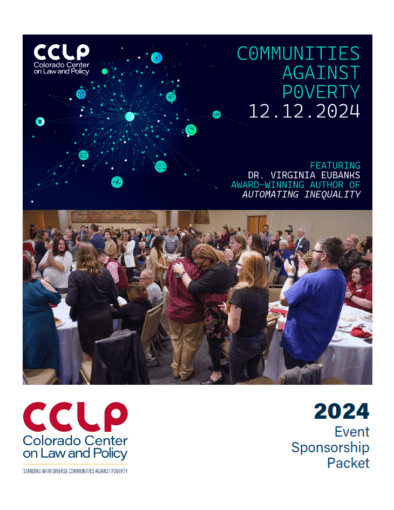
Each year, CCLP hosts Communities Against Poverty to recognize the incredible work of the individuals and organizations in the field of anti-poverty work across our state. If you or your organization is interested in sponsoring this annual event, please review the sponsorship levels in the packet linked below and register for your sponsorship today!
Champions for Economic Justice and Equity award winnners
Partner Organization of the Year:
Colorado Cross-Disability Coalition
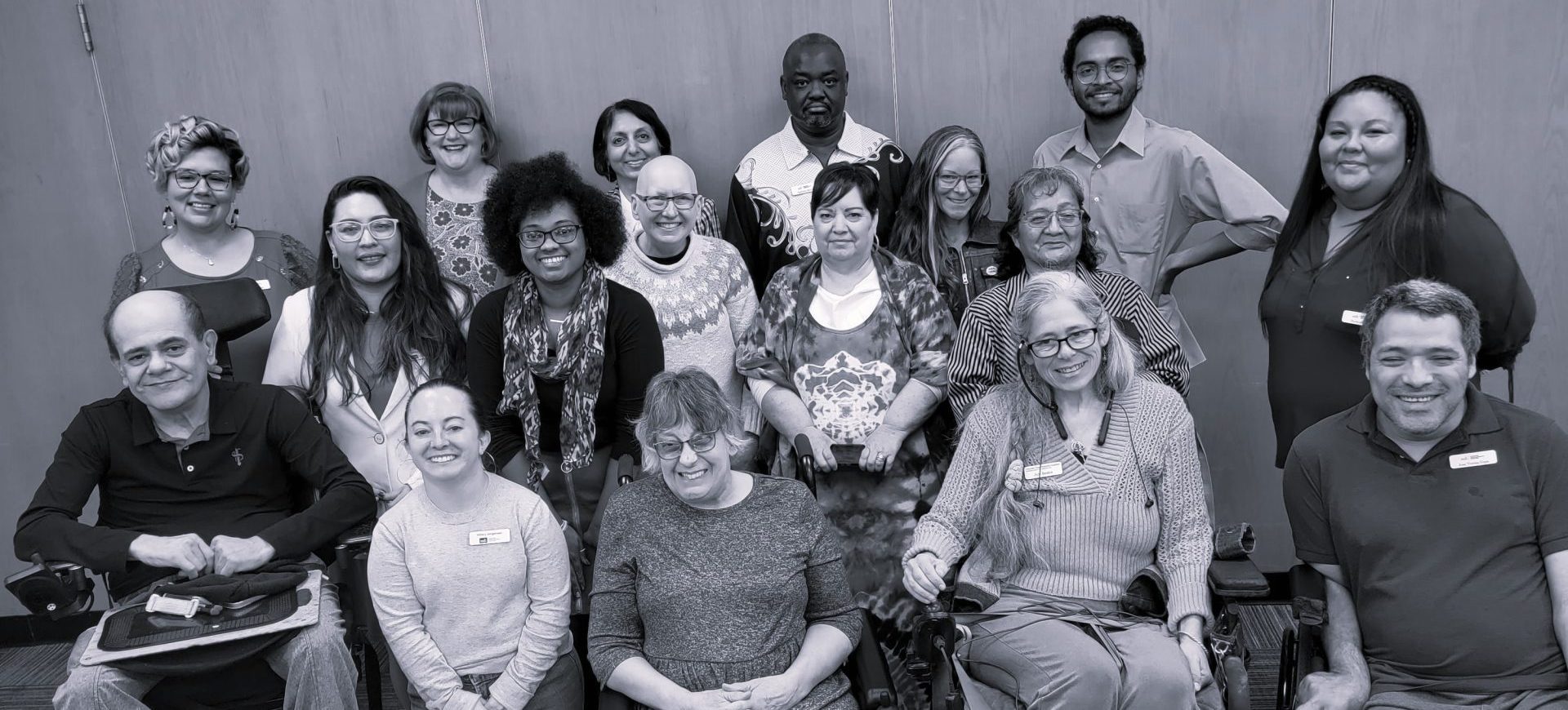
Colorado Cross-Disability Coalition was founded in 1990 following the signing of the Americans with Disabilities Act to ensure that Coloradans with disabilities were duly protected by the new federal law and living better lives because of the protections they had been granted via the ADA.
In the earliest days of CCDC, an all-volunteer staff focused on educating the community about the ADA, how the law was intended to function, and potential actions Coloradans could take if they believed their rights had been violated under the ADA. To this day, the ADA remains central to CCDC’s work; the organization houses its own unique, successful civil rights legal program that specializes in the ADA, and continues to provide educational training on the ADA. Today, however, CCDC’s work extends well beyond the ADA to many other areas of legislation and policy that shape the lives of Coloradans with disabilities, including healthcare (with a focus on Medicaid), accessible housing and transportation, and equitable employment.
CCDC’s statewide initiatives have saved Colorado taxpayers millions of dollars while benefiting 500,000+ disabled residents and their families. CCDC continues to be an organization of people with disabilities, working for people with disabilities. With an unwavering commitment to uniting people with all types of disabilities across Colorado, CCDC uses its collective voice to advocate for civil and human rights for people with disabilities. CCDC has championed disability power for decades, and will continue to do so in the years ahead.
Legislator of the Year:
Representative Elizabeth Velasco
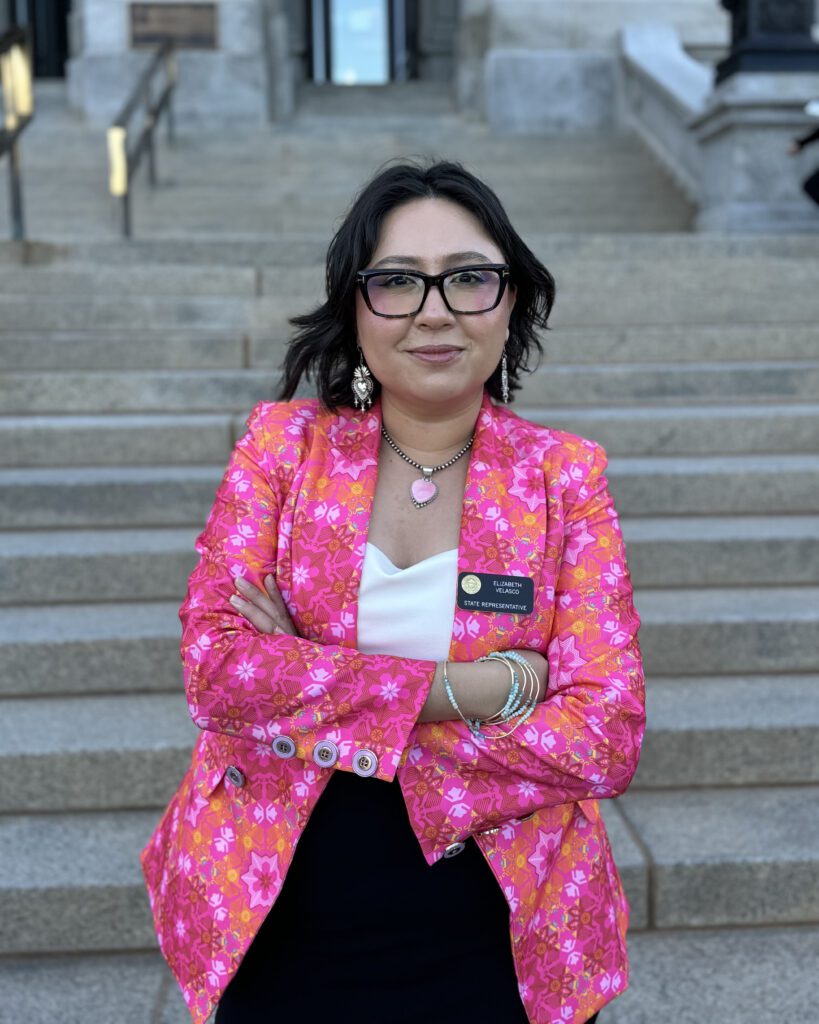
Representative Elizabeth Velasco represents House District 57 in western Colorado. She is the first Latina to represent the western slope and the first Mexican-born immigrant in the state legislature.
Representative Velasco grew up in the Vail Valley working in the service industry to pay for her education and support her family. She understands first-hand the struggles and dynamics of the rural resort working class. Before getting elected, she ran an interpretation and translation agency for almost ten years and became a wildland firefighter and public information officer.
She decided to run for office because for too long, too many of us have been left behind. In her first term, she passed groundbreaking legislation to protect residents of mobile home parks, expand language access in emergency response, improve wildfire resiliency in the state, and hold big polluters accountable.
She currently co-chairs the Colorado Democratic Latino Caucus and the Wildfire Matters interim committee. Representative Velasco is a strong voice for supporting working families, protecting natural resources, and adapting to a changing climate in western Colorado.
Government Partner of the Year:
Rebecca Balu
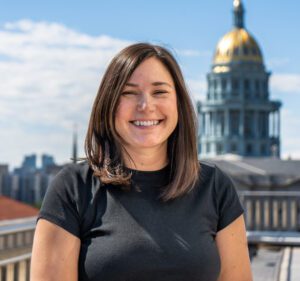
Rebecca Balu has worked in Colorado’s workforce development system for over 12 years. Since she began her career in helping individuals gain skills and secure employment through the Workforce Innovation and Opportunity Act, she has held leadership roles in county and state government agencies, managing multiple workforce development programs that support individuals overcome challenges to finding and keeping employment.
Since 2018, Rebecca has served as the Administrator of Strategic Partnerships for the Division of Economic and Workforce Support at the Colorado Department of Human Services, working with a dedicated team to oversee statewide workforce development programs that help public assistance recipients gain skills and access employment. Rebecca and her team have broadened the scope and reach of workforce development programs across Colorado.
Community Advocate of the Year:
Cruz Ramirez

Cruz Ramirez serves as the Child Care Coalition Facilitator at Lake County Build a Generation. She works directly with Lake County community members to create projects, share ideas and build connections in efforts to create a strong system of early care and education that supports the overall social and economic health and wellbeing of Lake County. Formerly, Cruz was the Community Organizer at Lake County Build a Generation. As Community Organizer, she worked with residents living in mobile homes to provide direct assistance to those having issues with their landlords and worked to ensure mobile home communities are healthy, equitable, and safe for all.
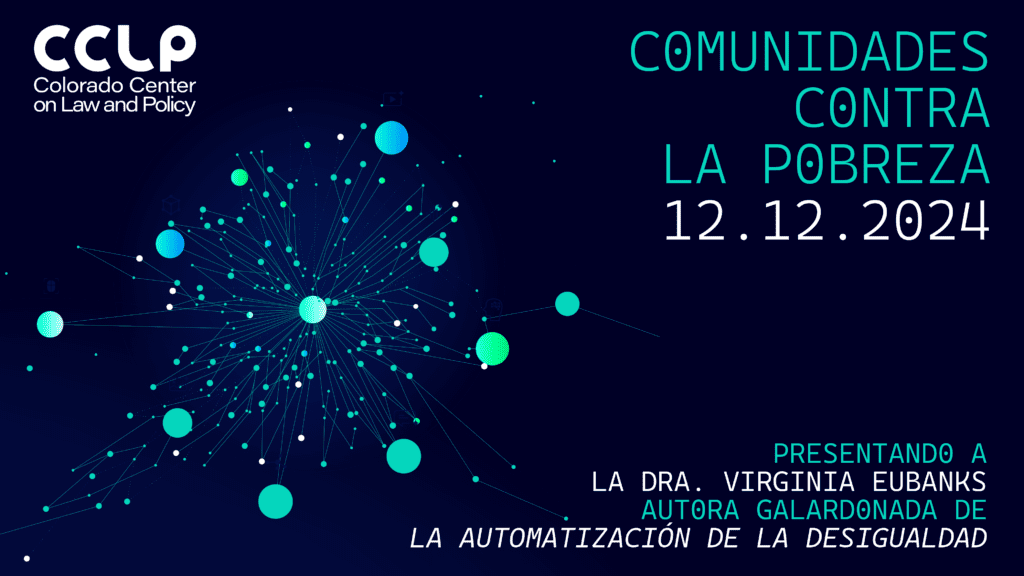
Comunidades Contra la Pobreza 2024
Sobre el evento
¡Únase a nosotros para nuestro evento anual Comunidades Contra la Pobreza el jueves 12 de diciembre de 11am a 1pm en el Centro de Historia de Colorado! Escuchará a nuestra oradora principal la Dra. Virginia Eubanks, la autora galardonada de “La automatización de la desigualdad: Herramientas de tecnología avanzada para supervisar y castigar a los pobres.“
También presentaremos los premios Campeones por la Justicia Económica y la Equidad de este año a los destacados organizadores comunitarios, organizaciones asociadas, legisladores e individuos que marcaron la diferencia en las vidas de los habitantes de Colorado durante el último año.
Durante todo el evento se ofrecerá un almuerzo buffet.
Este evento tiene un costo de entrada. Si el costo es una barrera, pero aún desea asistir, comuníquese con Bruce Barnum por teléfono al (303) 573-5669, ext. 312, o por correo electrónico a bbarnum@copolicy.org.
Keynote by Virginia Eubanks
 Virginia Eubanks es una reportera de investigación de formato largo, ensayista, memorialista y Profesora Asociada de Ciencias Políticas en la Universidad de Albany, SUNY. Es autora de “La automatización de la desigualdad: Herramientas de tecnología avanzada para supervisar y castigar a los pobres“; “Callejón sin Salida Digital: Luchando por la Justicia Social en la Era de la Información”; y coeditora, junto con Alethia Jones, de “No Voy a Dejar que Nadie Me Haga Retroceder: Cuarenta Años de Construcción de Movimiento con Barbara Smith”.
Virginia Eubanks es una reportera de investigación de formato largo, ensayista, memorialista y Profesora Asociada de Ciencias Políticas en la Universidad de Albany, SUNY. Es autora de “La automatización de la desigualdad: Herramientas de tecnología avanzada para supervisar y castigar a los pobres“; “Callejón sin Salida Digital: Luchando por la Justicia Social en la Era de la Información”; y coeditora, junto con Alethia Jones, de “No Voy a Dejar que Nadie Me Haga Retroceder: Cuarenta Años de Construcción de Movimiento con Barbara Smith”.
Sus reportajes de investigación y ensayos personales han aparecido en The New York Times Magazine, Scientific American, The Nation, Harper’s y Wired. Actualmente está trabajando en una memoria sobre la violencia comunitaria, el TEPT y el cuidado de personas. Junto con Andrea Quijada, está recopilando historias orales sobre el estado de bienestar automatizado global para Voice of Witness. Ha sido becaria o residente en MacDowell, Edward Albee, New America, Carey Institute for Global Good y Blue Mountain Center. Vive en Troy, NY.
Patrocinios para Comunidades Contra la Pobreza 2024

Cada año, Colorado Center on Law and Policy organiza un evento de celebración para reconocer el increíble trabajo de las personas y organizaciones en el campo de la lucha contra la pobreza en todo nuestro estado. Este evento incluye un discurso principal de un líder de pensamiento reconocido a nivel nacional, así como la ceremonia anual de entrega de los Premios Campeones de la Justicia Económica y la Equidad. ¡Si usted o su organización está interesado en patrocinar este evento anual, por favor revise los niveles de patrocinio en el paquete enlazado a continuación y regístrate para tu patrocinio hoy!
Ganadores del Premio Campeones por la Justicia y Equidad Económica
Organización Asociada del Año:
Colorado Cross-Disability Coalition

La Coalición de Colorado para la Discapacidad Transversal (Colorado Cross-Disability Coalition) fue fundada en 1990 tras la firma de la Ley para Estadounidenses con Discapacidades (ADA) para garantizar que los habitantes de Colorado con discapacidades estuvieran debidamente protegidos por la nueva ley federal y vivieran mejores vidas gracias a las protecciones que se les habían otorgado a través de la ADA.
En los primeros días de CCDC, un personal compuesto enteramente por voluntarios se centró en educar a la comunidad sobre la ADA, cómo se pretendía que funcionara la ley y las posibles acciones que los habitantes de Colorado podían tomar si creían que sus derechos habían sido violados bajo la ADA. Hasta el día de hoy, la ADA sigue siendo fundamental para el trabajo de CCDC; la organización alberga su propio programa legal único y exitoso de derechos civiles que se especializa en la ADA, y continúa brindando capacitación educativa sobre la ADA. Sin embargo, hoy en día, el trabajo de CCDC se extiende mucho más allá de la ADA hacia muchas otras áreas de legislación y política que dan forma a las vidas de los habitantes de Colorado con discapacidades, incluyendo la atención médica (con un enfoque en Medicaid), vivienda y transporte accesibles, y empleo equitativo.
Las iniciativas estatales de CCDC han ahorrado millones de dólares a los contribuyentes de Colorado mientras benefician a más de 500,000 residentes discapacitados y sus familias. CCDC continúa siendo una organización de personas con discapacidades, trabajando para personas con discapacidades. Con un compromiso inquebrantable de unir a personas con todo tipo de discapacidades en Colorado, CCDC usa su voz colectiva para abogar por los derechos civiles y humanos de las personas con discapacidades. CCDC ha defendido el poder de la discapacidad durante décadas y continuará haciéndolo en los años venideros.
Legisladora del Año:
Representante Elizabeth Velasco

La Representante Elizabeth Velasco representa el Distrito 57 de la Cámara de Representantes en el oeste de Colorado. Es la primera latina en representar la vertiente occidental y la primera inmigrante mexicana nacida en el extranjero en la legislatura estatal.
La Representante Velasco creció en el Valle de Vail trabajando en la industria de servicios para pagar su educación y mantener a su familia. Conoce de primera mano las luchas y la dinámica de la clase trabajadora rural de los centros turísticos. Antes de ser electa, dirigió una agencia de interpretación y traducción durante casi diez años y se convirtió en bombero forestal y oficial de información pública.
Actualmente, co-preside el Caucus Latino Demócrata de Colorado y el comité interino de Asuntos de Incendios Forestales. La Representante Velasco es una voz fuerte para apoyar a las familias trabajadoras, proteger los recursos naturales y adaptarse al cambio climático en el oeste de Colorado.
Socia Gubernamental del Año:
Rebecca Balu

Rebecca Balu ha trabajado en el sistema de desarrollo de la fuerza laboral de Colorado durante más de 12 años. Desde que inició su carrera ayudando a las personas a adquirir habilidades y asegurar empleo a través de la Ley de Innovación y Oportunidad Laboral, ha ocupado roles de liderazgo en agencias gubernamentales de condado y estado, gestionando múltiples programas de desarrollo de la fuerza laboral que ayudan a las personas a superar desafíos para encontrar y mantener el empleo.
Desde 2018, Balu se desempeña como Administradora de Alianzas Estratégicas para la División de Apoyo Económico y de Fuerza Laboral en el Departamento de Servicios Humanos de Colorado, trabajando con un equipo dedicado para supervisar programas estatales de desarrollo de la fuerza laboral que ayudan a los beneficiarios de asistencia pública a adquirir habilidades y acceder al empleo. Balu y su equipo han ampliado el alcance y el ámbito de los programas de desarrollo de la fuerza laboral en todo Colorado.
Defensora Comunitaria del Año:
Cruz Ramirez

Cruz Ramirez se desempeña como Facilitadora de la Coalición de Cuidado Infantil en Lake County Build a Generation. Ella trabaja directamente con miembros de la comunidad del Condado de Lake para crear proyectos, compartir ideas y construir conexiones en esfuerzos para crear un sistema sólido de cuidado y educación temprana que apoye la salud y el bienestar social y económico general del Condado de Lake. Anteriormente, Cruz fue Organizadora Comunitaria en Lake County Build a Generation. Como Organizadora Comunitaria, trabajó con residentes que viven en casas móviles para brindar asistencia directa a aquellos que tenían problemas con sus arrendadores y trabajó para asegurar que las comunidades de casas móviles sean saludables, equitativas y seguras para todos.

